- Home
- Leo Tolstoy
The Death of Ivan Ilych Page 4
The Death of Ivan Ilych Read online
Page 4
They were all in good health. It could not be called ill
health if Ivan Ilych sometimes said that he had a queer taste in
his mouth and felt some discomfort in his left side.
But this discomfort increased and, though not exactly painful,
grew into a sense of pressure in his side accompanied by ill
humour. And his irritability became worse and worse and began to
mar the agreeable, easy, and correct life that had established
itself in the Golovin family. Quarrels between husband and wife
became more and more frequent, and soon the ease and amenity
disappeared and even the decorum was barely maintained. Scenes
again became frequent, and very few of those islets remained on
which husband and wife could meet without an explosion. Praskovya
Fedorovna now had good reason to say that her husband's temper was
trying. With characteristic exaggeration she said he had always
had a dreadful temper, and that it had needed all her good nature
to put up with it for twenty years. It was true that now the
quarrels were started by him. His bursts of temper always came
just before dinner, often just as he began to eat his soup.
Sometimes he noticed that a plate or dish was chipped, or the food
was not right, or his son put his elbow on the table, or his
daughter's hair was not done as he liked it, and for all this he
blamed Praskovya Fedorovna. At first she retorted and said
disagreeable things to him, but once or twice he fell into such a
rage at the beginning of dinner that she realized it was due to
some physical derangement brought on by taking food, and so she
restrained herself and did not answer, but only hurried to get the
dinner over. She regarded this self-restraint as highly
praiseworthy. Having come to the conclusion that her husband had
a dreadful temper and made her life miserable, she began to feel
sorry for herself, and the more she pitied herself the more she
hated her husband. She began to wish he would die; yet she did not
want him to die because then his salary would cease. And this
irritated her against him still more. She considered herself
dreadfully unhappy just because not even his death could save her,
and though she concealed her exasperation, that hidden exasperation
of hers increased his irritation also.
After one scene in which Ivan Ilych had been particularly
unfair and after which he had said in explanation that he certainly
was irritable but that it was due to his not being well, she said
that he was ill it should be attended to, and insisted on his going
to see a celebrated doctor.
He went. Everything took place as he had expected and as it
always does. There was the usual waiting and the important air
assumed by the doctor, with which he was so familiar (resembling
that which he himself assumed in court), and the sounding and
listening, and the questions which called for answers that were
foregone conclusions and were evidently unnecessary, and the look
of importance which implied that "if only you put yourself in our
hands we will arrange everything -- we know indubitably how it has
to be done, always in the same way for everybody alike." It was
all just as it was in the law courts. The doctor put on just the
same air towards him as he himself put on towards an accused
person.
The doctor said that so-and-so indicated that there was so-
and-so inside the patient, but if the investigation of so-and-so
did not confirm this, then he must assume that and that. If he
assumed that and that, then...and so on. To Ivan Ilych only one
question was important: was his case serious or not? But the
doctor ignored that inappropriate question. From his point of view
it was not the one under consideration, the real question was to
decide between a floating kidney, chronic catarrh, or appendicitis.
It was not a question the doctor solved brilliantly, as it seemed
to Ivan Ilych, in favour of the appendix, with the reservation that
should an examination of the urine give fresh indications the
matter would be reconsidered. All this was just what Ivan Ilych
had himself brilliantly accomplished a thousand times in dealing
with men on trial. The doctor summed up just as brilliantly,
looking over his spectacles triumphantly and even gaily at the
accused. From the doctor's summing up Ivan Ilych concluded that
things were bad, but that for the doctor, and perhaps for everybody
else, it was a matter of indifference, though for him it was bad.
And this conclusion struck him painfully, arousing in him a great
feeling of pity for himself and of bitterness towards the doctor's
indifference to a matter of such importance.
He said nothing of this, but rose, placed the doctor's fee on
the table, and remarked with a sigh: "We sick people probably
often put inappropriate questions. But tell me, in general, is
this complaint dangerous, or not?..."
The doctor looked at him sternly over his spectacles with one
eye, as if to say: "Prisoner, if you will not keep to the
questions put to you, I shall be obliged to have you removed from
the court."
"I have already told you what I consider necessary and proper.
The analysis may show something more." And the doctor bowed.
Ivan Ilych went out slowly, seated himself disconsolately in
his sledge, and drove home. All the way home he was going over
what the doctor had said, trying to translate those complicated,
obscure, scientific phrases into plain language and find in them an
answer to the question: "Is my condition bad? Is it very bad? Or
is there as yet nothing much wrong?" And it seemed to him that the
meaning of what the doctor had said was that it was very bad.
Everything in the streets seemed depressing. The cabmen, the
houses, the passers-by, and the shops, were dismal. His ache, this
dull gnawing ache that never ceased for a moment, seemed to have
acquired a new and more serious significance from the doctor's
dubious remarks. Ivan Ilych now watched it with a new and
oppressive feeling.
He reached home and began to tell his wife about it. She
listened, but in the middle of his account his daughter came in
with her hat on, ready to go out with her mother. She sat down
reluctantly to listen to this tedious story, but could not stand it
long, and her mother too did not hear him to the end.
"Well, I am very glad," she said. "Mind now to take your
medicine regularly. Give me the prescription and I'll send Gerasim
to the chemist's." And she went to get ready to go out.
While she was in the room Ivan Ilych had hardly taken time to
breathe, but he sighed deeply when she left it.
"Well," he thought, "perhaps it isn't so bad after all."
He began taking his medicine and following the doctor's
directions, which had been altered after the examination of the
urine. but then it happened that there was a contradiction between
/> the indications drawn from the examination of the urine and the
symptoms that showed themselves. It turned out that what was
happening differed from what the doctor had told him, and that he
had either forgotten or blundered, or hidden something from him.
He could not, however, be blamed for that, and Ivan Ilych still
obeyed his orders implicitly and at first derived some comfort from
doing so.
From the time of his visit to the doctor, Ivan Ilych's chief
occupation was the exact fulfillment of the doctor's instructions
regarding hygiene and the taking of medicine, and the observation
of his pain and his excretions. His chief interest came to be
people's ailments and people's health. When sickness, deaths, or
recoveries were mentioned in his presence, especially when the
illness resembled his own, he listened with agitation which he
tried to hide, asked questions, and applied what he heard to his
own case.
The pain did not grow less, but Ivan Ilych made efforts to
force himself to think that he was better. And he could do this so
long as nothing agitated him. But as soon as he had any
unpleasantness with his wife, any lack of success in his official
work, or held bad cards at bridge, he was at once acutely sensible
of his disease. He had formerly borne such mischances, hoping soon
to adjust what was wrong, to master it and attain success, or make
a grand slam. But now every mischance upset him and plunged him
into despair. He would say to himself: "there now, just as I was
beginning to get better and the medicine had begun to take effect,
comes this accursed misfortune, or unpleasantness..." And he was
furious with the mishap, or with the people who were causing the
unpleasantness and killing him, for he felt that this fury was
killing him but he could not restrain it. One would have thought
that it should have been clear to him that this exasperation with
circumstances and people aggravated his illness, and that he ought
therefore to ignore unpleasant occurrences. But he drew the very
opposite conclusion: he said that he needed peace, and he watched
for everything that might disturb it and became irritable at the
slightest infringement of it. His condition was rendered worse by
the fact that he read medical books and consulted doctors. The
progress of his disease was so gradual that he could deceive
himself when comparing one day with another -- the difference was
so slight. But when he consulted the doctors it seemed to him that
he was getting worse, and even very rapidly. Yet despite this he
was continually consulting them.
That month he went to see another celebrity, who told him
almost the same as the first had done but put his questions rather
differently, and the interview with this celebrity only increased
Ivan Ilych's doubts and fears. A friend of a friend of his, a very
good doctor, diagnosed his illness again quite differently from the
others, and though he predicted recovery, his questions and
suppositions bewildered Ivan Ilych still more and increased his
doubts. A homeopathist diagnosed the disease in yet another way,
and prescribed medicine which Ivan Ilych took secretly for a week.
But after a week, not feeling any improvement and having lost
confidence both in the former doctor's treatment and in this one's,
he became still more despondent. One day a lady acquaintance
mentioned a cure effected by a wonder-working icon. Ivan Ilych
caught himself listening attentively and beginning to believe that
it had occurred. This incident alarmed him. "Has my mind really
weakened to such an extent?" he asked himself. "Nonsense! It's
all rubbish. I mustn't give way to nervous fears but having chosen
a doctor must keep strictly to his treatment. That is what I will
do. Now it's all settled. I won't think about it, but will follow
the treatment seriously till summer, and then we shall see. From
now there must be no more of this wavering!" this was easy to say
but impossible to carry out. The pain in his side oppressed him
and seemed to grow worse and more incessant, while the taste in his
mouth grew stranger and stranger. It seemed to him that his breath
had a disgusting smell, and he was conscious of a loss of appetite
and strength. There was no deceiving himself: something terrible,
new, and more important than anything before in his life, was
taking place within him of which he alone was aware. Those about
him did not understand or would not understand it, but thought
everything in the world was going on as usual. That tormented Ivan
Ilych more than anything. He saw that his household, especially
his wife and daughter who were in a perfect whirl of visiting, did
not understand anything of it and were annoyed that he was so
depressed and so exacting, as if he were to blame for it. Though
they tried to disguise it he saw that he was an obstacle in their
path, and that his wife had adopted a definite line in regard to
his illness and kept to it regardless of anything he said or did.
Her attitude was this: "You know," she would say to her friends,
"Ivan Ilych can't do as other people do, and keep to the treatment
prescribed for him. One day he'll take his drops and keep strictly
to his diet and go to bed in good time, but the next day unless I
watch him he'll suddenly forget his medicine, eat sturgeon -- which
is forbidden -- and sit up playing cards till one o'clock in the
morning."
"Oh, come, when was that?" Ivan Ilych would ask in vexation.
"Only once at Peter Ivanovich's."
"And yesterday with shebek."
"Well, even if I hadn't stayed up, this pain would have kept
me awake."
"Be that as it may you'll never get well like that, but will
always make us wretched."
Praskovya Fedorovna's attitude to Ivan Ilych's illness, as she
expressed it both to others and to him, was that it was his own
fault and was another of the annoyances he caused her. Ivan ilych
felt that this opinion escaped her involuntarily -- but that did
not make it easier for him.
At the law courts too, Ivan Ilych noticed, or thought he
noticed, a strange attitude towards himself. It sometimes seemed
to him that people were watching him inquisitively as a man whose
place might soon be vacant. Then again, his friends would suddenly
begin to chaff him in a friendly way about his low spirits, as if
the awful, horrible, and unheard-of thing that was going on within
him, incessantly gnawing at him and irresistibly drawing him away,
was a very agreeable subject for jests. Schwartz in particular
irritated him by his jocularity, vivacity, and *savoir-faire*,
which reminded him of what he himself had been ten years ago.
Friends came to make up a set and they sat down to cards.
They dealt, bending the new cards to soften them, and he sorted the
diamonds in his hand and found he had seven. His partner said "No
&nb
sp; trumps" and supported him with two diamonds. What more could be
wished for? It ought to be jolly and lively. They would make a
grand slam. But suddenly Ivan Ilych was conscious of that gnawing
pain, that taste in his mouth, and it seemed ridiculous that in
such circumstances he should be pleased to make a grand slam.
He looked at his partner Mikhail Mikhaylovich, who rapped the
table with his strong hand and instead of snatching up the tricks
pushed the cards courteously and indulgently towards Ivan Ilych
that he might have the pleasure of gathering them up without the
trouble of stretching out his hand for them. "Does he think I am
too weak to stretch out my arm?" thought Ivan Ilych, and forgetting
what he was doing he over-trumped his partner, missing the grand
slam by three tricks. And what was most awful of all was that he
saw how upset Mikhail Mikhaylovich was about it but did not himself
care. And it was dreadful to realize why he did not care.
They all saw that he was suffering, and said: "We can stop if
you are tired. Take a rest." Lie down? No, he was not at all
tired, and he finished the rubber. All were gloomy and silent.
Ivan Ilych felt that he had diffused this gloom over them and could
not dispel it. They had supper and went away, and Ivan Ilych was
left alone with the consciousness that his life was poisoned and
was poisoning the lives of others, and that this poison did not
weaken but penetrated more and more deeply into his whole being.
With this consciousness, and with physical pain besides the
terror, he must go to bed, often to lie awake the greater part of
the night. Next morning he had to get up again, dress, go to the
law courts, speak, and write; or if he did not go out, spend at
home those twenty-four hours a day each of which was a torture.
And he had to live thus all alone on the brink of an abyss, with no
one who understood or pitied him.
V
So one month passed and then another. Just before the New
Year his brother-in-law came to town and stayed at their house.
Ivan Ilych was at the law courts and Praskovya Fedorovna had gone
shopping. When Ivan Ilych came home and entered his study he found
his brother-in-law there -- a healthy, florid man -- unpacking his
portmanteau himself. He raised his head on hearing Ivan Ilych's
footsteps and looked up at him for a moment without a word. That
stare told Ivan Ilych everything. His brother-in-law opened his
mouth to utter an exclamation of surprise but checked himself, and
that action confirmed it all.
"I have changed, eh?"
"Yes, there is a change."
And after that, try as he would to get his brother-in-law to
return to the subject of his looks, the latter would say nothing
about it. Praskovya Fedorovna came home and her brother went out
to her. Ivan Ilych locked to door and began to examine himself in
the glass, first full face, then in profile. He took up a portrait
of himself taken with his wife, and compared it with what he saw in
the glass. The change in him was immense. Then he bared his arms
to the elbow, looked at them, drew the sleeves down again, sat down
on an ottoman, and grew blacker than night.
"No, no, this won't do!" he said to himself, and jumped up,
went to the table, took up some law papers and began to read them,
but could not continue. He unlocked the door and went into the
reception-room. The door leading to the drawing-room was shut. He
approached it on tiptoe and listened.
"No, you are exaggerating!" Praskovya Fedorovna was saying.
"Exaggerating! Don't you see it? Why, he's a dead man! Look
at his eyes -- there's no life in them. But what is it that is
wrong with him?"
"No one knows. Nikolaevich [that was another doctor] said
something, but I don't know what. And Seshchetitsky [this was the
celebrated specialist] said quite the contrary..."
Ivan Ilych walked away, went to his own room, lay down, and
began musing; "The kidney, a floating kidney." He recalled all
the doctors had told him of how it detached itself and swayed
about. And by an effort of imagination he tried to catch that

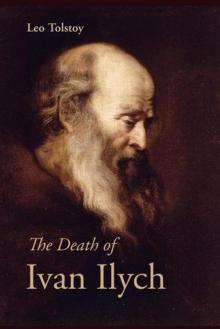 The Death of Ivan Ilych
The Death of Ivan Ilych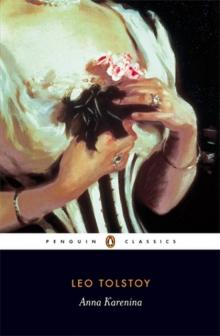 Anna Karenina
Anna Karenina Resurrection
Resurrection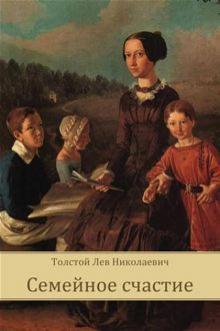 Family Happiness
Family Happiness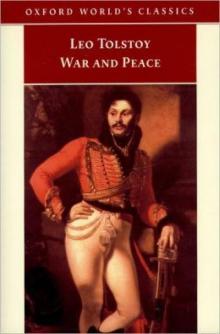 War and Peace
War and Peace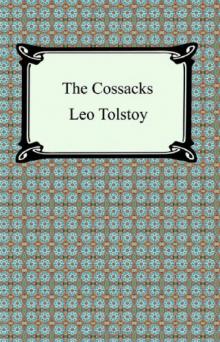 The Cossacks
The Cossacks The Kreutzer Sonata
The Kreutzer Sonata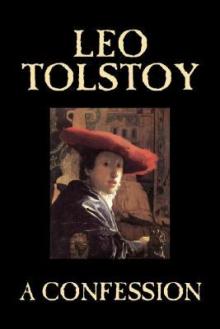 A Confession
A Confession The Kingdom of God Is Within You
The Kingdom of God Is Within You Father Sergius
Father Sergius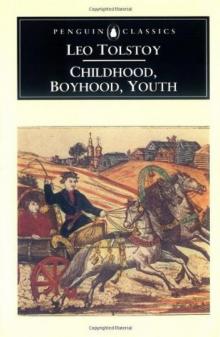 Childhood, Boyhood, Youth
Childhood, Boyhood, Youth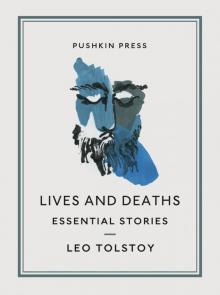 Lives and Deaths
Lives and Deaths The Devil
The Devil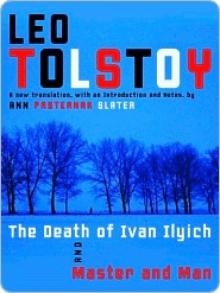 The Death of Ivan Ilyich and Master and Man
The Death of Ivan Ilyich and Master and Man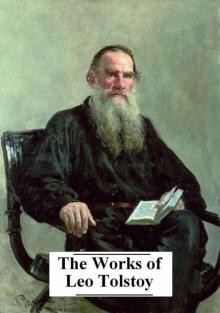 The Complete Works of Leo Tolstoy (25+ Works with active table of contents)
The Complete Works of Leo Tolstoy (25+ Works with active table of contents)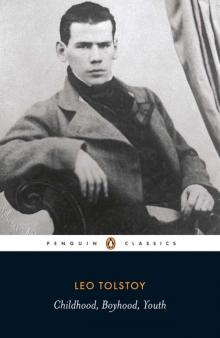 Childhood, Boyhood, Youth (Penguin ed.)
Childhood, Boyhood, Youth (Penguin ed.)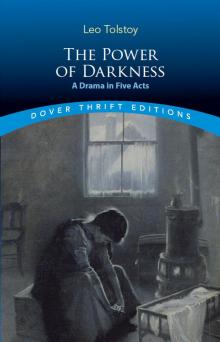 The Power of Darkness
The Power of Darkness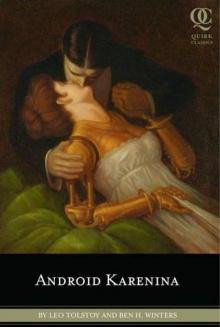 Android Karenina
Android Karenina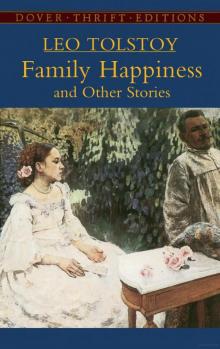 Family Happiness and Other Stories
Family Happiness and Other Stories The Lion and the Puppy
The Lion and the Puppy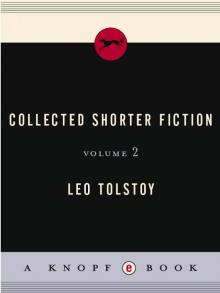 Collected Shorter Fiction, Volume 2
Collected Shorter Fiction, Volume 2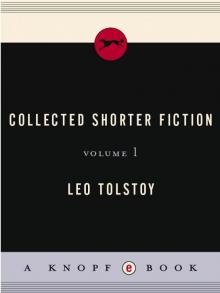 Collected Shorter Fiction, Volume 1
Collected Shorter Fiction, Volume 1